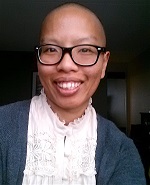 Elizabeth (liz) Anh Thomson (they/them/theirs) identifies as a bi/queer, Vietnamese adoptee, disabled, gender non-conforming, cisgender female. They were adopted from Vietnam in 1974 by two sisters, Alva (ma) and Betty Thomson (mom). They were raised in Indianapolis, IN in a predominantly white, middle class neighborhood. They studied German and Sociology in undergraduate; Master’s in Women and Gender Studies; and currently a fourth year PhD candidate in Disability Studies, at the University of Illinois at Chicago. They have a passion for documentary photography, community organizing, and being an educator. For the past five years, liz has been doing eldercare with mom and has learned a lot about the healthcare industrial complex, aging experience, and how marginalized the elder communities are.
Elizabeth (liz) Anh Thomson (they/them/theirs) identifies as a bi/queer, Vietnamese adoptee, disabled, gender non-conforming, cisgender female. They were adopted from Vietnam in 1974 by two sisters, Alva (ma) and Betty Thomson (mom). They were raised in Indianapolis, IN in a predominantly white, middle class neighborhood. They studied German and Sociology in undergraduate; Master’s in Women and Gender Studies; and currently a fourth year PhD candidate in Disability Studies, at the University of Illinois at Chicago. They have a passion for documentary photography, community organizing, and being an educator. For the past five years, liz has been doing eldercare with mom and has learned a lot about the healthcare industrial complex, aging experience, and how marginalized the elder communities are.
Until five years ago, I didn’t think a lot about eldercare. But for the past five years, I have been the primary caregiver for my mom, Betty, who is white. Mom uses she/her/hers pronouns. My other parent (Betty’s sister) had died in 2010, and I was not fully aware of mom’s declining health. I remember thinking I wish I had known. I would have been more involved and gotten help for her.
About a year ago, mom and I came to the stark realization that her finances were quickly being depleted, and the care from the assisted living place where she was living was declining. I decided that I would temporarily come back to Indiana, live with her, and do full-time eldercare. It was a very big change for both of us.
I wanted to do this interview with her to hear what she was thinking and to share our experiences with the community. While some days can be rough – like when she catches me roll my eyes at her – I appreciate that she is still determined to be her own person.
In my academic program of Disability Studies, there are ideas of interdependence and self-advocacy. While I didn’t enter the program because of mom, I have been able to put into practical application a lot of theories I learned in the classroom.
On a gray and rainy afternoon, I asked mom the following questions. She sat in her dark brown lift chair behind a small folding table. Since living together, we’ve found our own daily routine. Breakfast, work a little, lunch while watching an art show on PBS, work some more and then dinner, watch some TV, and then the bedtime routine. We try to go out for lunch at least once a week, and we’ve recently been attending an LGBTQ inclusive church on the south side of Indianapolis.
“I want to read that before you send it,” mom asserts. “I hope I don’t sound too…”
“Yes, definitely, mom,” I reply.

How would you introduce yourself?
I’m Betty Thomson. I’m a retired teacher and have two children and five grandchildren. I grew up in Louisville, KY and went to a public school. When I graduated from high school, I went to Richmond, KY to Eastern Kentucky State College (now called Eastern Kentucky University). I’m almost 80 years old. I’ll be 80 in a month and a half. I have a sister, who is almost 82 and a brother who is 76. I lost my other sister who was two years younger than me. We spent our adult life raising two adopted babies from Vietnam.
How would you describe your illnesses?
I have COPD, which makes it hard to breathe, so I’m on oxygen and have trouble with CO2 levels. When they got too high, I’ve had to go to the hospital (at least twice now). Now I’m on a machine that helps with that. I also have bad arthritis. I’ve had both my knees replaced and my shoulder. It’s also hard for me to grasp things with my hand. This past year I also had cataract surgery. I’m also hard of hearing.
How would you describe your past and current living situation?
I lived in a house that I bought in 1971 for about 40 years, I’m not sure. I lived there until what the doctors thought was a stroke, but not sure. They said it wasn’t safe for me to live alone (my one sister had died and my two adult kids lived out of state).
When I had this health crisis, I ended up in the hospital and had to go to rehabilitation. Since I couldn’t live by myself, my daughter found an assisted living facility in Greenwood, IN, which was very nice – but very expensive. After five years, it was eating up too much of my money, and my daughter, who was studying in Chicago in a PhD program, gave up her apartment and found a nice apartment for us to share.
Thinking back when you were younger, what were your expectations about growing older?
I expected to live in my own home and die there, like my sister had done. She was living with me when she died. She was way too young. I had expected to live at home and keep driving and keep banking and shopping, like I always had. I had expected to be able to go visit my daughters. My one daughter has five children, and I had expected to drive and visit them. However, arthritis incapacitated me, and I wasn’t able to walk, and I ended up having to use an electric scooter and a walker. I had a lot of pain and took a lot of medicine.
Do you remember reading or watching anything about getting older?
I don’t remember reading anything. I was watching my parents grow older. My father died pretty young. He was about 65 and had just retired. But, my mother lived to be 80. She spent a lot of those years living with me, and I took care of her. But once she got to the point where she really couldn’t get around, she went to a nursing home in Kentucky. And that’s where she died. She was always a very kind, loving person, but it was still difficult to care for her, because my kids were doing activities in middle school, and I was very involved. It was more difficult to do both (eldercare and kid care).
What are some of the challenges you face?
The challenges are not being able to do what I want to do. Not being able to move and then getting sick. It takes longer to get well after getting sick. And I also (for the first time) had to start worrying about money. Afraid that it wouldn’t last. It’s challenging to just keep my health so I wouldn’t be sick all the time. Also, having to deal with incontinence and having to be on oxygen 24 hours a day. I worry about Alzheimer’s, because my sister in-law had died of that. I try and keep my brain engaged so I don’t lose that. Lastly, giving up my dream of losing weight. I had lost weight numerous times over the years, and I had to give up the idea of being a “normal” size person.
What brings you happiness?
I would say mainly being with my family, painting, and making crafts and art projects. Having my family come and visit makes me really happy. Right now, I’m finishing up a painting of my niece and my father from a photograph. I’m looking forward to making Christmas tree ornaments with my grandchildren when they come for Thanksgiving. I’m looking forward to painting some horses, because I’ve never painted animals before. I made jewelry for a while. Pretty much any kind of craft or house type of thing (painting, wallpaper hanging, and gardening), I’ve done.
What do you hope your grandkids remember about you?
I hope my grandkids remember that I loved them. That I made them feel good about themselves. I want them to grow up to be independent thinkers and educated. I want them to do a lot of things in their lives and not be settled.
What advice would you give to professionals who work with older people?
I think patience and caring are the big requirements to work with seniors and elderly. If you have these traits, you’ll do what needs to be done. The person will really know that you care. Old people know when they’re not wanted and not appreciated. Old people don’t like being a burden. And, unless they’re pretty sick, especially mentally, they appreciate what you do for them.
Is there anything else you’d like to share?
Yeah, I do. A lot of people would be afraid to adopt. My children, we gave them a lot of things. We exposed them to different things that would enrich their lives. They turned out to be wonderful people. I’m very proud of both of them. They are both loving and caring people. They’re making their lives and doing the things I encouraged them to.
The opinions expressed in this article are those of the author and do not necessarily reflect those of the Diverse Elders Coalition.

